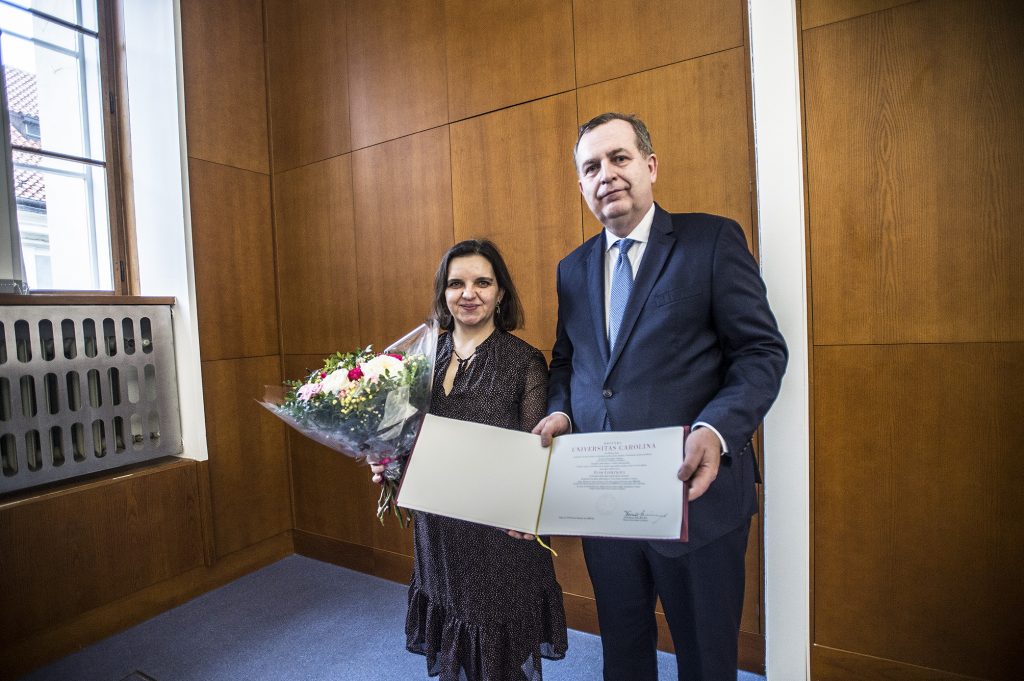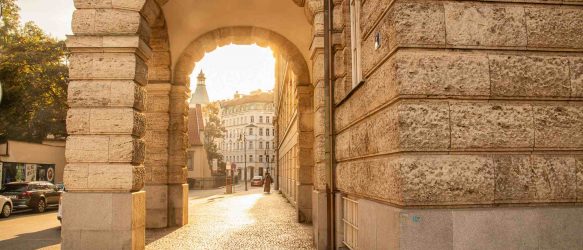Linguist Mgr. Eva Lehečková, PhD., was appointed the Dean of the Faculty of Arts, Charles University, on 1 February 2022. On this occasion, we release an interview outlining her immediate tasks and long-term ambitions of the new management.

How would you describe the situation in which the Faculty of Arts is at the beginning of 2022?
The most befitting characteristic is probably “attentive anticipation of the things to come.” Firstly, the Czech Government, the management of both Charles University and the Faculty of Arts changed in these few months. At the same time, we are reaching the end of significant projects focused on excellent research and innovations in education, so we have to prepare new ones – as always with uncertain results. Therefore, I believe that the faculty is now waiting for the right moment and is biding its time. A great asset of people with education in humanities, who constitute the faculty, is that they can work with uncertainty and creatively cope with it.
What are the most important issues you need to address immediately after you take office?
It will be crucial to reduce the uncertainties mentioned in the first answer which we have under our control as soon as possible. We have to launch a new interfaculty cooperation programme Cooperatio. We also have to implement a new career system prepared by the university that tends to the career growth of the academics. We are also obliged to draw up and present a balanced budget for 2022 to the Academic Senate of CU FA, which resembles an adrenaline sport in pandemic times. These are the most essential tasks we have to do until approximately this June that will influence the life at the faculty in the future.
What are the tasks that you think will accompany you during your whole term?
I consider the ability to provide wider and more stable support for the preparation of difficult international grants or operational projects as crucial. Our faculty has an excellent grant office that is, with regard to the approaching opportunities, beyond its staff capacity. I believe that better support will pay off in the number of obtained projects, which will be not strictly scientific but also focused on education and the application of research results in practice. The fact that CU FA is preparing the highest number of applications for the European Research Council’s prestigious projects in history only confirms that my decision is right.
In the following years, we will address the reconstruction of the two interconnected buildings in Opletalova street that may resolve the long-standing issue of insufficient space for education, administration, and research. It is one of the smaller investments in the context of the whole Charles University, but crucial for us, and I will be looking forward that the result will be as beautiful as the architectural project. During my whole term, we will have to pay attention to the stabilization of finances so that the faculty has reserves for strategic development.
What are the tasks you are looking forward to?
I am especially looking forward to working with people even though our variety of expertise and the plurality of stances sometimes produce a little bit of cacophony and headache. And regarding people, I believe we will find a way how to secure better remuneration and how to remove some, especially administrative, obstacles that make the work of the staff more difficult.
Likewise, I take into consideration what is happening at other faculties and universities which is why I am interested in social security, respect in mutual relationships between teachers and students, and also students with each other. Therefore, I am looking forward to preparing an institution of ombudsman in cooperation with the management of the university that we will connect with other supportive means we can offer in difficult life situations. Furthermore, sustainability and responsibility towards the environment also have a special significance to me. Even a humanistic faculty can be and should act responsibly. It should also help to ensure that the public does not see such responsibility to the world around them as a hobby of spoiled youth and that respect towards the environment will become a norm. I am glad that we are in agreement on that matter with my future collegium.
What should be the role of the faculty in civil society?
The choice of the subjunctive in your question is interesting – as if the role of the public universities was uncertain in society. Sometimes, I sense such uncertainty in society, but I personally believe that we are responsible for the development of the society we are part of by offering education and research, and putting the research results into practice. In this respect, I believe that our faculty copes with its role brilliantly. We may prove this claim by dozens of our projects.
I would like to point out yet another thing: we also have excellent scholars in basic research. Only thanks to them we will be able to, for example, read through a unique edition of Karel Havlíček Borovský’s correspondence (note: writer, poet, and one of the most important figures of the Czech modern literature) to better understand his era and its similarity to the present day – if I could name one example for all. But a similar format has also archaeology – it works with material artefacts as with imprints of their periods. This contribution of humanistic faculties is often taken for granted or trivialized because it cannot be as easily measured as a quantitative assessment of science. But in a society that values education, it is necessary to attribute the contribution with corresponding importance.
But our work does not stand outside of the current events. The faculty’s research teams examine various aspects of life during the pandemic – for example, they focus on the origin and spread of disinformation. They explore the impact of the pandemic on mental resilience, the spread of various addictions, or the changes in communication due to the wearing of masks and increase in distance meetings.
How would you evaluate the public image of the faculty and what are you planning to do with it?
This is a pressing issue. At the moment, our public image is a mishmash of general views on humanistic education, institutions that provide it, and particular media events of the past years. That is why we have become a target of superstitions, stereotypes, and assumptions that are products of not only the general unfamiliarity with who we are and what we do but also the desire to comfort a public enemy in a world that is categorized in neat boxes.
My duty lies in two areas. On the one hand, to do everything I can to make the useful results of our work more visible in the public space. Secondly, I intend to support our academia – from activities of academics to student projects – so that my colleagues are more inclined to enter the public space and share their opinions with courage. We will help scholars understand how media works so that they are not handicapped by stereotypes that await them there. In the end, we will overcome them: we must simply face them.
How can be excellent scientific work and research with international relevance supported?
This is not rocket science. Especially, we have to leave the scholars in peace so that they can create and research, share their ideas with students and colleagues across generations. We can make their life easier, for example, by reducing paperwork, establishing an environment where they could reshape their ideas into competitive projects, international cooperation, and publications. The only problem is that it takes more than one term to do so. I will, therefore, follow up on the steps of my predecessors and hope that I will see more positive changes by the end of my term.










